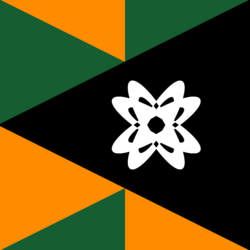Kyldigard
This article is incomplete because it is pending further input from participants, or it is a work-in-progress by one author. Please comment on this article's talk page to share your input, comments and questions. Note: To contribute to this article, you may need to seek help from the author(s) of this page. |
The Confederation of Kyldigardian Cantons Kyldigard | |
|---|---|
|
Flag | |
| Motto: "Our Pride is Our People" | |
| Capital and | Muremysct |
| Official languages | Kylerur |
| Recognised national languages | Kylerur and further dialects |
| Ethnic groups | Kyler (89%), Human (11%) |
| Religion | Reljanism |
| Demonym(s) | Kyldigardian (citizen); Kyler (native species) |
| Government | Confederated Democratic Republic |
• Grand Warden | Giyeng Kuyi |
| Legislature | Council of Wardens |
| Establishment | |
• The Grand Kyler Slave Revolution | 414 AR |
• The Grand Migration | 415-498 AR |
• Beginning of the War on Kveutonia | 501 AR |
• Establishment of Muremysct | 518 AR |
| Population | |
• 1611 AR estimate | ~27,000,000 |
| GDP (nominal) | estimate |
• Per capita | 21,132,151 Ching (42,349 USD) |
| Currency | Ching (CNG) |
| Date format | dd/mm/yy |
Kyldigard (Kylerur: Kyldigard [kɪldiɡɑθd]), officially The Confederation of Kyldigardian Cantons, is an organized ethnic community and de facto democratic republic located in northwestern Pelia, strattling the edge of the Clastoclites. To its west is the Kesper Sea and to its north is the Wintry Ocean. Its capital city is Muremysct, and it has a population of about 27,000,000 Kyler and Human citizens and residents, of which 3%, or about 800,000 are of the indigenous stone-age Scizc Nation. The Confederation is made up of 19 de facto cantons and several hundred unincorporated communes and other small township residences. Although Kyldigard's de facto governing body, the Council of Wardens, is very benevolent in their application of Kyldigard's de-facto state religion, Relejenism, the vast majority of Kyldigard's Kyler population considers themselves highly devout in the faith.
Etymology
History
Genesis of the Kyler Species
Around 150-200 AR, scientists from the Empire of Kethes began experiments in the field of synthetic evolution, eventually leading them to produce the genetic ancestors of modern Kyler to fill a niche role of servitude for the upper and ruling classes of Kethes. By 250 AR, a stable population of approximately 100,000 Kyler was being maintained in Kethes. Due to selectively evolved docility, the first several generations of Kyler were submissive to the wills of their creators and were also unable to reproduce naturally, despite being built to be reproductively compatible with multiple other species found in Kethes at the time. Although the exact date is unknown, it is well known that by 380 AR, most of the Kyler population had devolved the docility and infertility traits and developed the ability to feel and understand complex emotions and abstract concepts.
4th Century Kyler Slave Unrest & 5th Century Revolts
Due to perceived cruel treatment of Kyler slaves by their Kethesian masters, the Kyler planned and on many occasions failed small local slave revolts. Underground Kyler societies began to form which rallied for liberation, with some radical sects even calling for the extermination of their Kethesian overlords. At midnight in the winter of 414 AR, after being planned for decades, the Great Slave Revolution brought the mass slaughter of around 120,000 slave-owning Kethesians, leading to a royal decree that permanently banned Kyler production and slavery and exiling all Kyler currently residing within Kethes.
Grand Migration and Early Territorial Wars
Due to the harsh desert terrain outside of Kethes, the Kyler people migrated northward, discovering magic and art during the 5th Century AR on their way to what is now modern Kyldigard. Around 501 AR, the Kyler encountered the Kveutonian Empire, sacking it as it collapsed in on itself and pushing the prior Kveutonian residents out of their cold yet fertile central lands. Due to no de jure treaty having been signed, the Confederation of Kyldigardian Cantons is still de facto at war with Kveutonia to this day, although no actual conflicts have arisen since 1308 AR.
Kyldigard, once established by its people, made easy allies with Khijovia in both nation's early days after the fall of the Kveutonian Empire, however after disputes arose regarding the Kyldigardian Border Cantons, the two nations would abandon being officially allied and go to war multiple times for territory and superiority.
Geography
Physical Geography
Geology
Volcanism
Seismic Activity
Hydrography
Climate
Meteorology
Ecosystem
Biomes
[[File:]]
